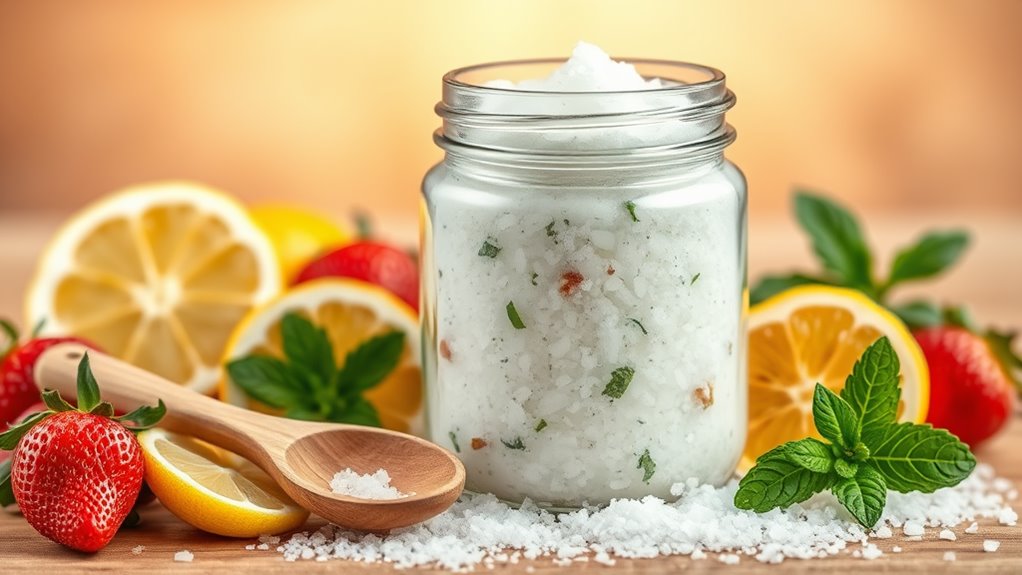Natural Remedies That Are Backed by Science
Natural remedies are gaining traction as people look for effective, science-backed options for health and wellness. From turmeric’s anti-inflammatory properties to garlic’s immune support, these natural solutions can play a significant role in your daily routine. But how do these remedies work, and what benefits can you truly expect? Understanding the science behind them might just change the way you approach your health. Let’s explore some of these powerful options together.
Key Takeaways
- Turmeric, rich in curcumin, is scientifically proven to reduce inflammation and combat chronic diseases when included in the diet.
- Garlic supports heart health by lowering blood pressure and cholesterol, while also enhancing immune function through increased white blood cell activity.
- Omega-3 fatty acids improve cognitive function, reduce neuroinflammation, and stabilize mood, with regular consumption leading to significant health benefits.
- Ginger effectively alleviates nausea from various causes, supported by active compounds like gingerol in both food and supplement forms.
- Probiotics promote gut health by balancing beneficial bacteria, improving digestion, and inhibiting harmful pathogens, thus alleviating digestive conditions like IBS.
Turmeric: The Anti-Inflammatory Powerhouse
When you think of natural remedies, turmeric often stands out due to its powerful anti-inflammatory properties. This golden spice, rich in curcumin, effectively combats chronic inflammation linked to various diseases.
You can harness its benefits by incorporating turmeric into your diet, whether in curries, smoothies, or as a supplement. Research supports its efficacy, showing that curcumin may reduce markers of inflammation in the body.
To maximize absorption, pair it with black pepper, which enhances curcumin’s bioavailability. As you explore natural remedies, remember to consult with a healthcare professional, especially if you’re on medications.
Ginger: A Natural Solution for Nausea
Turmeric isn’t the only natural remedy with impressive health benefits. Ginger stands out as a potent solution for nausea.
Research shows that ginger can effectively alleviate motion sickness, morning sickness during pregnancy, and even nausea from chemotherapy. When you consume ginger, its active compounds, like gingerol, interact with your body’s systems, reducing the feeling of queasiness.
You can enjoy ginger in various forms—whether as tea, in food, or as supplements. For ideal results, aim for a daily intake of about 1-1.5 grams. This amount can help you harness ginger’s full potential without overwhelming your system.
Garlic: Heart Health and Immune Support
Garlic, a staple in many kitchens, isn’t just a flavorful ingredient—it also boasts significant health benefits, particularly for heart health and immune support. Studies show that garlic can lower blood pressure, reduce cholesterol levels, and enhance your immune function. Incorporating garlic into your diet can be a simple yet effective way to bolster your overall health.
| Benefit | Description |
|---|---|
| Blood Pressure Reduction | Helps relax blood vessels, improving circulation. |
| Cholesterol Control | Lowers LDL cholesterol, supporting heart health. |
| Immune Boost | Enhances white blood cell activity, fighting infections. |
| Antioxidant Properties | Neutralizes free radicals, reducing oxidative stress. |
| Anti-inflammatory | May help reduce inflammation in the body. |
With these benefits, garlic can be a powerful ally in your health regimen.
Peppermint: Easing Digestive Discomfort
Peppermint’s soothing properties can really help ease digestive discomfort.
Whether you prefer peppermint oil or herbal tea, you’ll find that both options offer unique benefits.
Just make sure to follow dosage and safety tips to maximize your experience.
Peppermint Oil Benefits
When you’re feeling bloated or have an upset stomach, peppermint oil can be a natural ally. This essential oil contains menthol, which has muscle-relaxing properties that can ease gastrointestinal discomfort.
By applying diluted peppermint oil to your abdomen, you can stimulate digestion and reduce gas buildup. Studies show that inhaling peppermint oil can also help relieve nausea, making it a versatile remedy for digestive issues.
Additionally, its soothing aroma can enhance your overall sense of well-being. To harness these benefits, consider using a diffuser or adding a few drops to your bath.
Herbal Tea Recommendations
If you’re looking for a soothing way to ease digestive discomfort, herbal teas can be a great choice, especially peppermint tea.
This aromatic brew contains menthol, which relaxes the muscles of the gastrointestinal tract, helping to alleviate bloating and gas. When you sip peppermint tea, you’re not just enjoying its invigorating flavor; you’re also benefiting from its antispasmodic properties that can calm digestive spasms.
To make the most of this herbal remedy, steep fresh or dried peppermint leaves in hot water for about 5 to 10 minutes. Experiment with different steeping times to find your perfect balance of flavor and potency.
Dosage and Safety Tips
To guarantee you reap the benefits of peppermint while minimizing any potential side effects, it’s important to pay attention to dosage.
For digestive discomfort, consider using peppermint oil capsules, typically dosed at 0.2 to 0.4 mL, three times daily. If you prefer tea, steep one teaspoon of dried peppermint leaves in hot water for about 10 minutes; this can be consumed up to three times a day.
Always consult with a healthcare professional before starting any new regimen, especially if you’re pregnant, nursing, or on medications.
Keep in mind that excessive use can lead to heartburn or allergic reactions. Moderation is key, so listen to your body and adjust your intake accordingly for ideal results.
Lavender: Stress Relief and Anxiety Reduction
Lavender, known for its soothing scent and vibrant purple blooms, has garnered attention for its ability to reduce stress and alleviate anxiety.
Research shows that inhaling lavender essential oil can lower cortisol levels, the hormone associated with stress. You can incorporate lavender into your routine by using diffusers, adding a few drops to your bath, or applying diluted oil to your skin.
Studies indicate that even simple practices, like sipping lavender tea, can promote relaxation. To maximize its effects, consider integrating lavender into your meditation or yoga sessions.
As you explore these methods, you’ll likely find that lavender not only calms your mind but also enhances your overall well-being, empowering you to face daily challenges with greater ease.
Honey: Soothing Coughs and Wounds
While you may reach for over-the-counter medications for coughs and minor wounds, honey offers a natural and effective alternative. Its unique properties can enhance your healing process and soothe discomfort.
Here’s how honey can help:
-
Antimicrobial Effect: Honey can inhibit bacteria, making it ideal for treating wounds.
-
Soothing Cough Suppressant: It coats the throat, reducing irritation and cough frequency.
-
Promotes Healing: Honey accelerates tissue regeneration, aiding wound recovery.
-
Moisturizing Properties: It keeps wounds hydrated, which is vital for healing.
Incorporating honey into your routine can provide a safe and powerful remedy.
Always choose raw, unprocessed honey to maximize its benefits.
With honey, you’re not just sweetening your tea; you’re enhancing your health.
Echinacea: Boosting Immune Function
Echinacea has long been celebrated for its potential to boost immune function, especially during cold and flu season. This powerful herb, derived from the Echinacea plant, contains active compounds that can enhance your immune response.
Studies suggest that Echinacea may reduce the severity and duration of respiratory infections, making it a wise choice for proactive health management. When taken at the onset of symptoms, it can stimulate white blood cell activity, priming your body to fend off pathogens more effectively.
For best results, consider using standardized extracts to guarantee you’re receiving a potent dose. Incorporating Echinacea into your wellness routine could be a game-changer for your immune health, empowering you to tackle seasonal illnesses with confidence and resilience.
Omega-3 Fatty Acids: Benefits for Brain Health
Omega-3 fatty acids are essential for maintaining brain health, and you might be surprised by their wide-ranging benefits.
They can improve cognitive function, regulate mood, and even offer neuroprotective properties.
Let’s explore how incorporating these powerful fats into your diet can enhance your overall mental well-being.
Cognitive Function Improvement
As you explore ways to boost your cognitive function, consider the powerful role of omega-3 fatty acids in promoting brain health.
These essential fats are vital for maintaining and enhancing your cognitive capabilities. Here’s how omega-3s can benefit you:
-
Improves Memory: Studies show omega-3s can enhance both short-term and long-term memory.
-
Enhances Focus: They support concentration and attention, making tasks easier to tackle.
-
Protects Brain Cells: Omega-3s help maintain the integrity of brain cells, reducing neurodegeneration.
-
Supports Learning: Regular intake can improve your ability to learn new information.
Incorporating omega-3-rich foods, such as fatty fish or flaxseeds, into your diet can be a game-changer for your cognitive function.
Mood Regulation Benefits
While you’re looking to enhance your mood, it’s worth noting that omega-3 fatty acids can play a significant role in emotional well-being. Research shows these essential fats may help reduce symptoms of depression and anxiety, leading to a more stable mood. By incorporating omega-3-rich foods into your diet, you can potentially experience a brighter outlook on life.
| Source | Omega-3 Content (g per serving) | Mood Regulation Benefits |
|---|---|---|
| Salmon | 2.0 | Reduces depressive symptoms |
| Chia Seeds | 5.0 | Improves overall emotional health |
| Walnuts | 2.5 | Enhances mood stability |
Embrace these natural remedies, and you could reveal a pathway to improved emotional resilience.
Neuroprotective Properties Explained
In addition to their mood-regulating benefits, omega-3 fatty acids have impressive neuroprotective properties that can greatly impact brain health. Incorporating these essential fats into your diet can lead to remarkable improvements.
Here are four key benefits:
-
Cognitive Function: Omega-3s enhance synaptic plasticity, vital for learning and memory.
-
Neuroinflammation Reduction: They help lower inflammation, protecting against neurodegenerative diseases.
-
Mood Stabilization: Omega-3s support neurotransmitter balance, reducing mood swings and anxiety.
-
Brain Structure Preservation: They contribute to maintaining the integrity of brain cell membranes.
Probiotics: Enhancing Gut Health
Probiotics play an essential role in enhancing gut health, offering a natural way to balance your digestive system. These beneficial bacteria improve your gut microbiome, supporting digestion and nutrient absorption.
When you consume probiotics, you’re not just adding friendly bacteria; you’re also fostering an environment that inhibits harmful pathogens. Research shows that regular intake can alleviate conditions like irritable bowel syndrome and diarrhea.
To maximize their benefits, incorporate a variety of probiotic-rich foods, such as yogurt, kefir, and fermented vegetables, into your diet. Additionally, consider high-quality supplements for targeted support.
Chamomile: Promoting Sleep and Relaxation
When you’re seeking a natural way to unwind and improve your sleep quality, chamomile might just be the answer. This gentle herb has been shown to promote relaxation and enhance sleep through its calming properties.
Here’s why you should consider incorporating chamomile into your routine:
-
Sedative Effects: Chamomile contains apigenin, an antioxidant that binds to brain receptors, promoting sleepiness.
-
Anxiety Reduction: Its calming properties can help alleviate anxiety, making it easier to drift off.
-
Digestive Aid: A cup of chamomile tea before bed can soothe your stomach, reducing discomfort that might interrupt sleep.
-
Anti-Inflammatory: Chamomile’s anti-inflammatory effects support overall health, contributing to a more restful night.
Embrace chamomile for a peaceful night’s sleep.
Frequently Asked Questions
Are Natural Remedies Safe for Children and Pregnant Women?
When considering natural remedies for children and pregnant women, you should always prioritize safety. Consult healthcare professionals for guidance, as not all remedies are suitable or effective, and individual circumstances can greatly impact their safety.
How Long Does It Take to See Results From Natural Remedies?
You’ll often see results from natural remedies within a few days to weeks, depending on the remedy and your body’s response. Consistency and patience are key, so stick with it for the best outcomes.
Can Natural Remedies Interact With Prescription Medications?
Yes, natural remedies can interact with prescription medications, potentially altering their effectiveness or causing side effects. Always consult your healthcare provider before starting any new remedy to guarantee your safety and ideal treatment outcomes.
Are There Any Side Effects Associated With These Natural Remedies?
Yes, some natural remedies can cause side effects, just like any treatment. You should monitor your body’s reactions closely and consult a healthcare professional to guarantee you’re making safe choices for your health and well-being.
How Should Natural Remedies Be Stored for Maximum Effectiveness?
To maximize effectiveness, store natural remedies in cool, dark places away from moisture and direct sunlight. Use airtight containers to protect them from air exposure and guarantee you label each remedy for easy identification.
Conclusion
Incorporating these natural remedies into your daily routine can greatly enhance your health and well-being. From turmeric’s anti-inflammatory benefits to garlic’s immune support, each option offers unique advantages. Don’t underestimate the power of herbs like ginger and chamomile for digestive comfort and relaxation. By embracing these science-backed solutions, you’re taking proactive steps toward a healthier lifestyle. So, go ahead and explore these remedies—they might just be what you need to feel your best!





